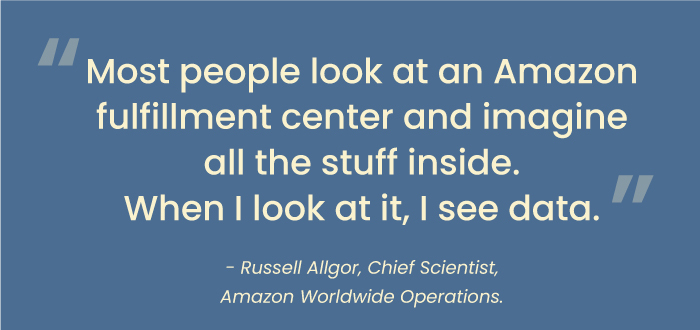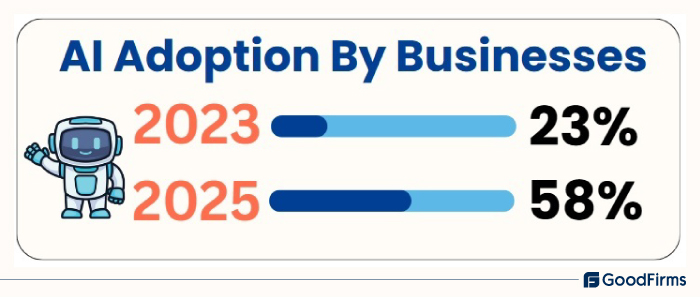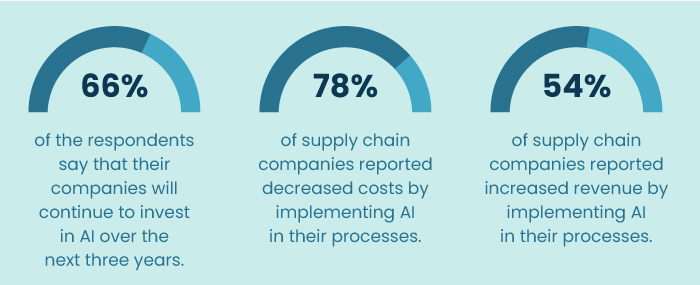Artificial Intelligence (AI) has drastically improved the way businesses manage their inventory and warehouse. The covid-19 pandemic outbreak proved to be a turning point for many physical and online stores, and it revolutionized and reshaped warehouse management to a greater extent. Increased demand for essential products and accelerating online sales during the pandemic drove businesses to adopt AI-based warehouse management solutions to automate and manage their inventory flawlessly and efficiently.
Earlier, AI was perceived as mere science fiction. But now, AI is everywhere in our life. From Alexa to personalized recommendations on eCommerce stores, we are using Artificial Intelligence knowingly and unknowingly on a daily basis. As far as warehouse management is concerned, AI has become an effective, cost-efficient, and sustainable solution to address the challenges of storing, stocking, and delivering products. Implementing AI can transform warehouse management from relying on human labor to a better, automated, and technology-centric process. This transformation is known as "Warehouse Automation."
Moreover, in 2021, the worldwide retail e-commerce sale amounted to around 4.9 trillion U.S. dollars and is expected to rise to 7.4 trillion U.S. dollars by 2025. The below online retail sales graph shows that the market has experienced drastic growth in eCommerce sales after the outbreak of the Covid-19 pandemic and is likely to increase consistently.

(Source: Statista)
This growth in online sales is an opportunity for the warehouse industry to grow. Recent reports indicate that online retail stores require an average of three times the size of warehouse space to store their products and carry out their operations compared to traditional brick-and-mortar stores. Also, with this accelerating sales comes increased competition. To survive in this cut-throat competitive era, the businesses that are open 24/7/365 need to automate their warehouse management to meet the growing customers' expectations and experience revenue growth.
Artificial Intelligence can help warehouses automate all their processes, including inventory management and workforce planning. For example, AI-powered warehouse automated tools can eliminate all the flaws relating to unloading pallets, product picking, packing items, and shipping. Besides saving operating costs, AI-based warehouse management systems can enable data-based decision-making that helps reduce wastage and increase the entire organization's profitability.
This proves that AI has concrete benefits ranging from better decision-making to improved customer experience and increased revenue growth. The future payoff of AI is even greater. It will give a competitive edge to its early adopters that the companies lagging behind in this technology adoption may never be able to cope with.
There are several competitive advantages of using AI-Based warehouse management systems that we will discuss in this article. But, before we elaborate on this topic, let's have a basic understanding of how AI has transformed warehouse operations and why do companies need modern warehouses equipped with AI powered devices and applications.
How AI Has Transformed Warehouse Operations?
AI has played a major role in transforming warehouse operations in terms of making it more efficient, dynamic, and responsive. You might have heard about AI-enabled robots picking up goods and distributing them to various touch points within a warehouse helping in saving time and eliminating human errors.
Besides that, the use of AI can empower modern warehouses to -
Analyze Journey of Each Order
AI-based warehouse systems help you to analyze the journey of each order allowing you to monitor the inventory on a consistent basis eliminating the chances of loss and wastage.
Fulfill Orders Quickly
As soon as you receive the order, the warehouse system with AI capabilities can easily locate the items making it easy for the employees to pick, pack, and ship ultimately leading to quick order fulfillments.
Personalize Communications
AI-enabled warehouse systems learn from the past interactions, and are capable of establishing automated personalized communication channels for the customers, suppliers, employees, etc. and speed up the processes.
Optimize Inventory Storage Space
After the products are sold, the AI-enabled warehouse management system can automatically detect the vacant storage space helping employees to make the optimum use of the warehouse based on different criteria like inventory volume and their shelf life.
Forecast Customer Demand
AI-enabled warehouse management systems are known for their forecasting capabilities and real-time information availability. You have all the information regarding sales, returns, and supplies available on the fingertips allowing you to make smarter decisions.
Basically, AI-based warehouse systems are based on three main concepts as given below -

Thus, AI-based systems can complete tasks intelligently with high-end accuracy and efficiency. It helps in improving productivity and penetrating flexibility within modern warehouses these days. Businesses these days are looking forward to executing AI in their warehouses to enhance the quality of their products and services, satisfy customers, and gain an edge over the competition.
To elaborate further on this topic, let’s have a look at why modern warehouses need AI systems.
You might have heard a lot about how AI is transforming many industries in the form of self-driving cars, image and voice recognition, fraud detection, real-time product recommendations, and many more. But, how do warehouses benefit from AI systems?
Why Do Modern Warehouses Need AI Systems?
Managing a warehouse requires organizing space, tracking inventory, scheduling labor, and fulfilling orders. AI based warehouse management systems can optimize and integrate all the processes and ensure that all the aspects of a warehouse run smoothly to keep costs low, save time, eliminate flaws, increase productivity, and stay competitive.
An AI-based warehouse management system enables warehouses to automate inventory management, and manage supply chain operations starting from manufacturing, purchasing, distribution, sales to order fulfillment. Additionally, it helps in optimizing storage spaces, and usage of inventory and resources ensuring minimized wastage and maximized productivity. It takes away all the human efforts required to complete routine tasks like billing, invoicing, emailing, scheduling, etc. streamlining the warehouse operations and taking the efficiency to the next level.
In eCommerce, when there is a surge in online sales, managing warehouse inventory scattered around the globe becomes challenging. In that case, AI-powered warehouse management software is a centralized platform that provides real-time information about the inventory stored in multiple facilities regardless of their geographical locations. Not only that, it also helps in analyzing and forecasting sales that helps warehouse management to purchase and store in a smart way avoiding financial losses caused due to inventory wastage.
To elaborate further on this topic, let's have a look at some of the most effective uses of AI-based warehouse management systems that help businesses to stay ahead of the competition and set new benchmarks.
Effective Uses of AI-based Warehouse Management System
AI can transform a traditional warehouse into a smart warehouse. AI-based warehouse management systems yield better results for distribution centers than traditional approaches of managing warehouses using obsolete software, excel spreadsheets, and manual registers.
Planning Workforce
Delegating tasks optimally is essential to ensure orders are fulfilled on time. Moreover, understaffed and overstaffed warehouses are both harmful to the business's financial health. AI-based warehouses provide a clear picture of staff allocation on a real-time basis. Based on that, managers can assign shifts to all the employees to get the jobs done within deadlines and gain expected productivity.
Managing Performance
AI can automate the data collection process, and it also can learn from past experiences. Taking that into consideration, AI-based warehouse management systems can help you analyze the performance of your employees intricately and allow you to come up with decisions and strategies that benefit your business in terms of productivity and revenue generation.
Categorizing Products
AI-based warehouse management systems can eliminate the manual efforts required to categorize products. On the contrary, it can help automate the categorization of the products based on their characteristics, demand, price, and many other criteria. Also, the AI-based warehouse management system can transform the strategies of categorization of the products with the changing situations based on past learnings and analyzed data.
Analyzing Product Demand
As real-time data analysis capabilities drive an AI-based warehouse management system, it can help forecast demand accurately and quickly respond to the market demand changes and inventory needs. AI helps you easily predict the future product demands and patterns to simplify the flow and storage of materials enabling profitable returns and outputs for your business.
Mitigating Risks
AI-powered warehouse management systems can help you prioritize tasks that enable resolving bottlenecks and meet the expectations of your customers, suppliers, and stakeholders. This ability to prioritize promptly can help mitigate risks that can prove to be expensive in the long run. On the other hand, the AI-based warehouse management system can help determine flaws in the process and address them on time.
Sending Alerts & Notifications
As soon as a particular product is out of stock, there is a delay in delivery, or any other unforeseen condition has arisen, the AI-based warehouse management software can send urgent alerts and notifications to your smartphone. This helps you to take proactive steps to eliminate errors and satisfy your customers.
Thus, AI has the potential to reduce the manual efforts and costs required to execute different warehouse management processes, from shelving products, order fulfillment to labor performance management. Finally, let's look at the top 10 ways AI-based warehouse management systems can offer businesses a competitive advantage.
Top 10 Ways AI-Based Warehouse Management Systems Offer a Competitive Advantage to the Businesses
#1 Reduces Handling & Storage Costs
AI-based warehouse management systems help you analyze the different warehouse spaces and dimensions of different products that need to be stored there. Based on that information, it also allows you to make decisions relating to stock to be ordered and how it is to be held depending on their shelf life. In this way, you can decide on how much stock is required to store and shipments are needed to fulfill the orders, ultimately reducing handling and storage costs. This enables you to keep your products safe and hygienic.
#2 Makes Data Accessibility Quick and Easy
Data is one of the significant assets for the business and holds a lot of value if accessible easily at the right time. For example, knowing how much stock is available in your warehouse is vital to purchasing and sales decisions. Knowing which products have been stored in multiple warehouses makes the picking and packing process quick. The AI-based warehouse management system is a centralized platform that allows accessing any information relating to warehouses and products stored easily from any remote location.

#3 Eliminates Human Errors
Improved accuracy is the key to business success. AI-based warehouse management systems keep an accurate inventory record stored in multiple facilities. It provides a centralized real-time view of the stock level lying even in warehouses located in different geographical locations. Moreover, it can automate arranging, stocking, and retrieving inventory items when required. This enables warehouses to eliminate human errors and carry out flawless processes to keep customers satisfied and generate more revenue for the company.
#4 Improves Customer Experience
It is an inevitable fact that delivering excellent customer experiences is the key to achieving positive business outcomes. Implementing an AI-based warehouse management system means no errors and delays in order fulfillment. Also, AI allows businesses to save costs, allowing them to quote competitive prices for their products and services. This helps improve customer experiences, ultimately enabling business organizations to grow monetarily and expand geographically.
#5 Better Resource Optimization
Optimal labor allocation is essential to ensure that the orders are shipped out on time, and the customers receive their products within a predetermined time. In many warehouses, supervisors and managers make staff allocation decisions based on their productivity, convenience, deadlines, and volume of work which can be prone to errors and biased or influenced by many other factors. But, AI-based warehouse management systems automate the process of resource allocation optimization based on the workers' experience and skills, leveraging competitive advantage to the organization on a large scale.
#7 Enhances Quality of Services
In warehouse management, an efficient process is required to ensure the correct flow of products and services from suppliers to the end customers. AI-based warehouse management systems mitigates risk arising from human errors, improves efficiency, automates tasks, and empowers the employees to deliver high-quality services to the customers. Moreover, AI-based warehouse management systems maintain an enhanced level of transparency throughout the process, enabling customers to acquire detailed and real-time information about their shipments which becomes a competitive advantage for the businesses and helps sustain companies' reputation.
#8 Improves Employee Satisfaction
As AI-based warehouse management systems learn from past experiences and perform human-like repetitive tasks without any intervention, your employees can focus more on making strategic decisions and revenue generation activities. This results in improved employee satisfaction and morale. Businesses now have gradually realized that AI is not here to take the place of humans but is there to help humans. Thus many companies are making use of AI-based warehouse management systems to get tasks done automatically without human intervention to keep employees happy and gain a competitive advantage.
#9 Enhances Workplace Security
Warehouse security plays a major role in keeping the business running without obstacles and gaining a competitive advantage. AI-based warehouse management systems include high-end security features that provide access to important information after systematic authorization. Thus, the chances of inventory theft can be avoided to a great extent by using AI-powered warehouse management tools resulting in consistent and sustainable business profits in the long run.
#10 Reduces Inventory Wastage
AI-based warehouse management software keeps you updated with the latest information about the inventory available in multiple warehouses. The right information about the inventory count allows you to purchase, store, and stock the balanced inventory, saving you from low stock or overstocking issues. Also, it helps you avoid product contamination issues. Suppose there is a high stock of a particular product that is not getting sold. In that case, the AI-powered warehouse management system notifies you about the same, allowing you to tweak your sales strategies to avoid deadstock situations. Precisely, AI-based warehouse management systems enable you to reduce inventory wastage to invest more in profitable stocks and run a competitive business.
Thus, the companies that have embraced AI as their technology partner to keep their warehouses smart have reported improved productivity, reduced costs, and more controllable errors. In the supply chain industry, even a minute saved can help acquire several competitive advantages, making an AI-based warehouse management system a must-have requirement for ambitious businesses that want to grow and progress consistently.
AI-Powered Warehouse Management - The Key to Business Growth
Thus, it becomes evident that the companies experiencing the biggest bottom-line due to AI adoption are likely to continue adopting the innovations in AI and invest in this technology more effectively and efficiently than their competitors.
Wrapping Up
AI is being integrated into warehouse management software to improve planning, productivity, and efficiency, which helps lower costs and exceed customer expectations. Moreover, AI in warehouse management has automated many complex tasks that have allowed human resources to focus more on strategic tasks.
After the Covid-19 pandemic emerged, many companies which relied on efficient warehouse management realized that they were not technologically equipped to handle the surge in orders. They needed to automate their supply chain processes to gain that capability. Order fulfillment delays and errors severely impacted the businesses that were lagging behind in terms of technology adoption. Fortunately, this pandemic was an eye-opener for many companies in terms of recognizing the value of AI in warehouse management and many other processes in the business world.
As per Data Bridge Market Research, Global Artificial Intelligence in the supply chain market is forecasted to reach USD 54.51 million by 2029, exhibiting a CAGR of 8.60% for the forecast period of 2022-2029.

Thus, AI implementation if successfully done can increase revenue, reduce costs, and enhance the productivity of the entire business organization. That is why many businesses are bound to expand their AI capabilities in their warehouses rather than contracting them to stay competitive and lead their respective industries.
If you are also planning to apply AI to convert your traditional warehouses into smart warehouses, just go through this well-researched list of the best warehouse management software by Goodfirms to make quick and intelligent purchasing decisions.










